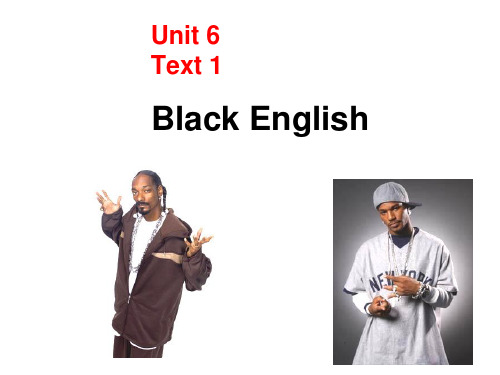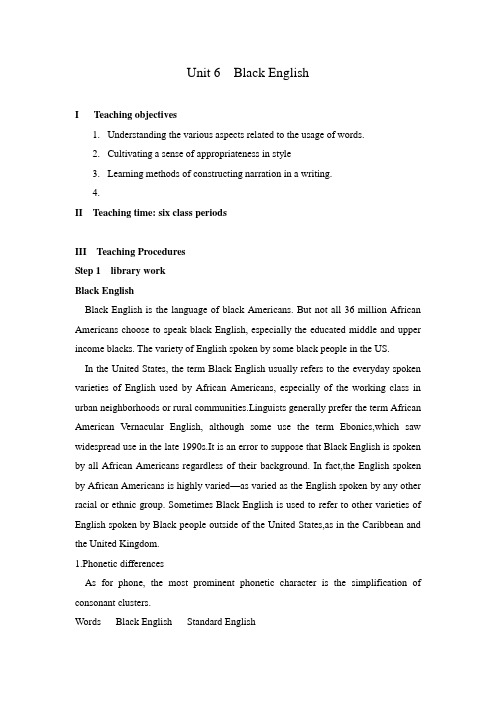新编英语教程6Unit 6 Black English精品PPT课件
- 格式:ppt
- 大小:10.48 MB
- 文档页数:57





Unit 6 Black EnglishI Teaching objectives1.Understanding the various aspects related to the usage of words.2.Cultivating a sense of appropriateness in style3.Learning methods of constructing narration in a writing.4.II Teaching time: six class periodsIII Teaching ProceduresStep 1 library workBlack EnglishBlack English is the language of black Americans. But not all 36 million African Americans choose to speak black English, especially the educated middle and upper income blacks. The variety of English spoken by some black people in the US.In the United States, the term Black English usually refers to the everyday spoken varieties of English used by African Americans, especially of the working class in urban neighborhoods or rural communities.Linguists generally prefer the term African American Vernacular English, although some use the term Ebonics,which saw widespread use in the late 1990s.It is an error to suppose that Black English is spoken by all African Americans regardless of their background. In fact,the English spoken by African Americans is highly varied—as varied as the English spoken by any other racial or ethnic group. Sometimes Black English is used to refer to other varieties of English spoken by Black people outside of the United States,as in the Caribbean and the United Kingdom.1.Phonetic differencesAs for phone, the most prominent phonetic character is the simplification of consonant clusters.Words Black English Standard EnglishPassed /pa:s/ /pa:st/Past /pa:s/ /pa:st/Desk /des/ /desk/The "Th" sound in Black English:V oiceless/initial position: V oiced/initial position:SE: thing, thank, thigh, thought SE: this, that, them, these, those BE:thing, thank, thigh, thought(no deviation) BE: dis, dat, dem, dese, doseV oiceless/medial: V oiced/medial:SE: bathroom, birthday SE: mother, brotherBE: bafroom, burfday BE: muvah, bruvahV oiceless/terminal:SE: with,mouth, path, both, southBE: wif, mouf, paf, bof, souf2.Lexical differencesA.SpellingE.g. There--dere, without--widout, don't know--dunno, zebra--aebray, himself--hisself Words that indicate the possessive:THEY for THEIRSE: The boys put their hats... BE: The boys put they hats...B. Difference in meaning and usagea. Be: 1) as a link verb, no change, meaning a habit e.g. She be late every day.2) as a future tense e.g. I be going home tomorrow.3) e.g. You are't sick,is you?4) been as a past action e.g. He been there before.b. Done: 1) done equals did2) e.g. I done my homework this morning.3) as a completed action e.g. I done finish my work today.c. Regular verb without ed: 1) She look for me last night.Disagreement of verb and pronounE.g. She have many friends.Mixed usage of s e.g. Two girl just left.3. Grammatical differencessentence structure of Black EnglishBe: 1) none-be rule e.g. He gone. She too tall.2) it is or there go replacing there be e.g. It's many children on the playground.3) double subject e.g. My son, he have a new car.4) double negative e.g. David don't know nothing.Step 2 organization of the textPart 1 the phenomena of black english in American society (paragraph 1)Part 2 the social prejudices of black English (paragraph 2-3)Part 3 the factors that lead to black English(paragraph 4-6)Part 4 the necessity of a proper attitude toward black EnglishStep 3 major language points1 Schizophrenia: a long term mental disorder marked by breakdown in the relation between thought, emotion, and behavior, leading to faulty perception, inappropriate actions and feelings, and withdrawal from reality.Here means confusion and bewilderment black Americans feel about the nature of their speech which can be likened to the disorderly mental status of a patient of schizophrenia.2 diglossiaTwo forms or varieties of the same language exist side by sideThe High variety– education, formalThe Low variety –casual, less standard…3 Stigmatize: (stigma [ n.])If someone or something is stigmatized, they are unfairly regarded by many people as being bad or having something to be ashamed of.Children in single-parent families must not be stigmatized.单亲家庭的孩子们不应该受到歧视。
